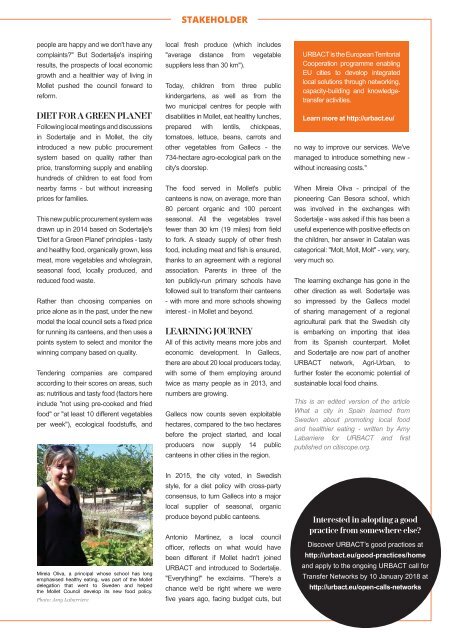Regions & Cities: The EU Agencies Race
EUobserver's 2017 Regions & Cities magazine takes a closer look at EU agencies and the benefits for cities and regions to host them. The UK leaving the EU has prompted a scramble for the European Medicines Agency and the European Banking Authority among most of the remaining member states. But what makes a city competitive? Which cities stand a good chance to become the new hosts? And what do EU agencies bring to the local economy?
EUobserver's 2017 Regions & Cities magazine takes a closer look at EU agencies and the benefits for cities and regions to host them. The UK leaving the EU has prompted a scramble for the European Medicines Agency and the European Banking Authority among most of the remaining member states. But what makes a city competitive? Which cities stand a good chance to become the new hosts? And what do EU agencies bring to the local economy?
You also want an ePaper? Increase the reach of your titles
YUMPU automatically turns print PDFs into web optimized ePapers that Google loves.
people are happy and we don't have any<br />
complaints?" But Sodertalje's inspiring<br />
results, the prospects of local economic<br />
growth and a healthier way of living in<br />
Mollet pushed the council forward to<br />
reform.<br />
DIET FOR A GREEN PLANET<br />
Following local meetings and discussions<br />
in Sodertalje and in Mollet, the city<br />
introduced a new public procurement<br />
system based on quality rather than<br />
price, transforming supply and enabling<br />
hundreds of children to eat food from<br />
nearby farms - but without increasing<br />
prices for families.<br />
This new public procurement system was<br />
drawn up in 2014 based on Sodertalje's<br />
'Diet for a Green Planet' principles - tasty<br />
and healthy food, organically grown, less<br />
meat, more vegetables and wholegrain,<br />
seasonal food, locally produced, and<br />
reduced food waste.<br />
Rather than choosing companies on<br />
price alone as in the past, under the new<br />
<br />
for running its canteens, and then uses a<br />
points system to select and monitor the<br />
winning company based on quality.<br />
Tendering companies are compared<br />
according to their scores on areas, such<br />
as: nutritious and tasty food (factors here<br />
include "not using pre-cooked and fried<br />
food" or "at least 10 different vegetables<br />
per week"), ecological foodstuffs, and<br />
local fresh produce (which includes<br />
"average distance from vegetable<br />
suppliers less than 30 km").<br />
Today, children from three public<br />
kindergartens, as well as from the<br />
two municipal centres for people with<br />
disabilities in Mollet, eat healthy lunches,<br />
prepared with lentils, chickpeas,<br />
tomatoes, lettuce, beans, carrots and<br />
other vegetables from Gallecs - the<br />
734-hectare agro-ecological park on the<br />
city's doorstep.<br />
<strong>The</strong> food served in Mollet's public<br />
canteens is now, on average, more than<br />
80 percent organic and 100 percent<br />
seasonal. All the vegetables travel<br />
<br />
to fork. A steady supply of other fresh<br />
<br />
thanks to an agreement with a regional<br />
association. Parents in three of the<br />
ten publicly-run primary schools have<br />
followed suit to transform their canteens<br />
- with more and more schools showing<br />
interest - in Mollet and beyond.<br />
LEARNING JOURNEY<br />
All of this activity means more jobs and<br />
economic development. In Gallecs,<br />
there are about 20 local producers today,<br />
with some of them employing around<br />
twice as many people as in 2013, and<br />
numbers are growing.<br />
Gallecs now counts seven exploitable<br />
hectares, compared to the two hectares<br />
before the project started, and local<br />
producers now supply 14 public<br />
canteens in other cities in the region.<br />
URBACT is the European Territorial<br />
Cooperation programme enabling<br />
<strong>EU</strong> cities to develop integrated<br />
local solutions through networking,<br />
capacity-building and knowledgetransfer<br />
activities.<br />
Learn more at http://urbact.eu/<br />
no way to improve our services. We've<br />
managed to introduce something new -<br />
without increasing costs."<br />
When Mireia Oliva - principal of the<br />
pioneering Can Besora school, which<br />
was involved in the exchanges with<br />
Sodertalje - was asked if this has been a<br />
useful experience with positive effects on<br />
the children, her answer in Catalan was<br />
categorical: "Molt, Molt, Molt" - very, very,<br />
very much so.<br />
<strong>The</strong> learning exchange has gone in the<br />
other direction as well. Sodertalje was<br />
so impressed by the Gallecs model<br />
of sharing management of a regional<br />
agricultural park that the Swedish city<br />
is embarking on importing that idea<br />
from its Spanish counterpart. Mollet<br />
and Sodertalje are now part of another<br />
URBACT network, Agri-Urban, to<br />
further foster the economic potential of<br />
sustainable local food chains.<br />
This is an edited version of the article<br />
What a city in Spain learned from<br />
Sweden about promoting local food<br />
and healthier eating - written by Amy<br />
<br />
published on citiscope.org.<br />
<br />
<br />
<br />
<br />
Photo: Amy Labarriere<br />
In 2015, the city voted, in Swedish<br />
style, for a diet policy with cross-party<br />
consensus, to turn Gallecs into a major<br />
local supplier of seasonal, organic<br />
produce beyond public canteens.<br />
Antonio Martinez, a local council<br />
<br />
been different if Mollet hadn't joined<br />
URBACT and introduced to Sodertalje.<br />
"Everything!" he exclaims. "<strong>The</strong>re's a<br />
chance we'd be right where we were<br />
<br />
Interested in adopting a good<br />
practice from somewhere else?<br />
<br />
http://urbact.eu/good-practices/home<br />
and apply to the ongoing URBACT call for<br />
Transfer Networks by 10 January 2018 at<br />
http://urbact.eu/open-calls-networks

















